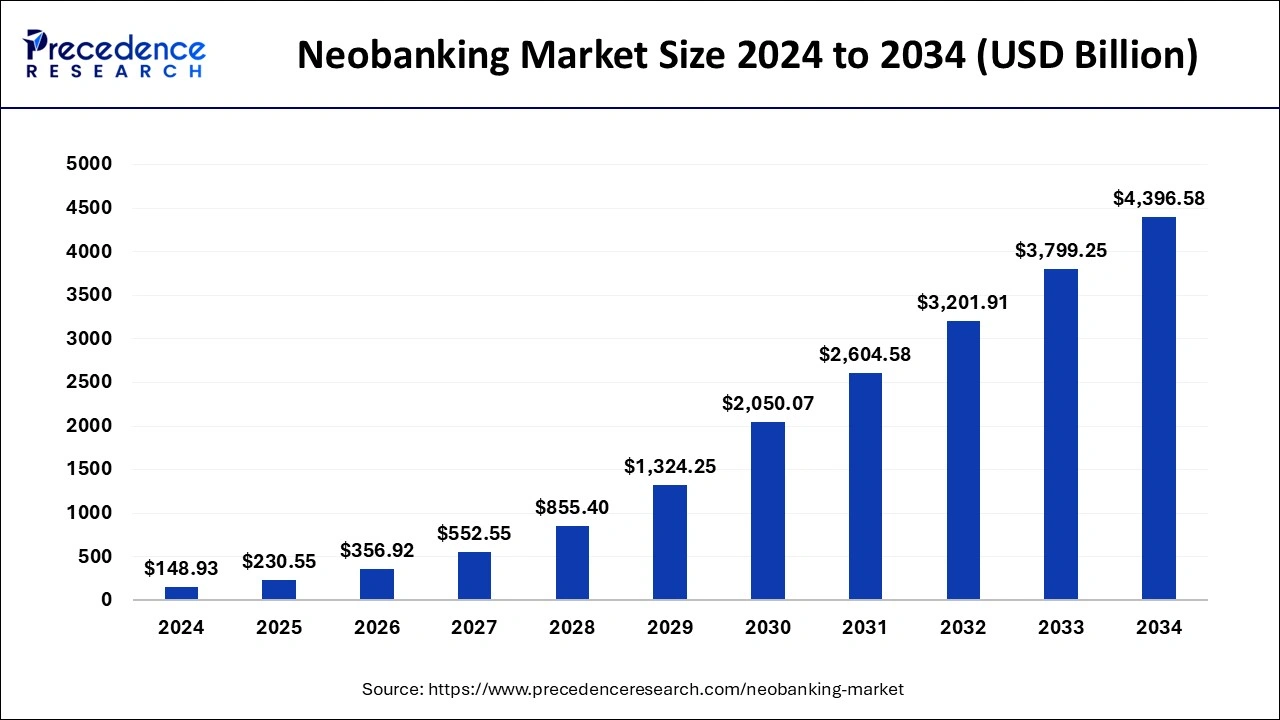Neobanking Market Size to Attain USD 3,799.25 Billion by 2033
The global neobanking market size is expected to increase USD 3799.25 billion by 2033 from USD 96.20 billion in 2023 with a CAGR of 44.42% between 2024 and 2033.
Key Points
- Europe dominated the market with the largest revenue share of 34% in 2023.
- Asia Pacific is expected to experience significant expansion in the market in the upcoming years.
- By account type, the business account segment has held the major revenue share of 67% in 2023.
- By account type, the saving accounts segment is expected to witness significant growth in the market over the projected period.
- By application, the enterprise segment has recorded more than 52% of revenue share in 2023.
- By application, the personal segment is expected to witness the fastest growth in the market.
The neobanking market has witnessed significant growth in recent years, driven by the rapid digitization of financial services and the increasing demand for convenient and efficient banking solutions. Neobanks, also known as digital banks or challenger banks, operate exclusively online without any physical branches, offering a range of financial services such as savings accounts, payment processing, loans, and investment options. These banks leverage technology to streamline operations, enhance customer experience, and provide competitive rates and fees compared to traditional banks.
Get a Sample: https://www.precedenceresearch.com/sample/4315
Growth Factors
Several factors contribute to the growth of the neobanking market. The increasing adoption of smartphones and internet connectivity has facilitated access to digital banking services, particularly among tech-savvy millennials and Gen Z consumers. Additionally, regulatory changes and advancements in financial technology (fintech) have lowered barriers to entry, enabling more players to enter the market and innovate rapidly. Moreover, the flexibility, scalability, and cost-efficiency of digital banking platforms attract both customers and investors, driving further growth in the industry.
Region Insights:
The neobanking trend is particularly prominent in regions with a high degree of smartphone penetration and a growing demand for digital financial services. While neobanks originated in developed markets such as the United States and Europe, they have also gained traction in emerging economies like India, Brazil, and Southeast Asia. These regions offer significant untapped potential due to large unbanked or underbanked populations seeking accessible and affordable banking solutions.
Neobanking Market Scope
| Report Coverage | Details |
| Growth Rate from 2024 to 2033 | CAGR of 44.42% |
| Neobanking Market Size in 2023 | USD 96.20 Billion |
| Neobanking Market Size in 2024 | USD 148.93 Billion |
| Neobanking Market Size by 2033 | USD 3,799.25 Billion |
| Largest Market | Europe |
| Base Year | 2023 |
| Forecast Period | 2024 to 2033 |
| Segments Covered | By Account Type and By Application |
| Regions Covered | North America, Europe, Asia-Pacific, Latin America, and Middle East & Africa |
Neobanking Market Dynamics
Drivers
Several key drivers are fueling the expansion of the neobanking market. One major driver is the shift in consumer preferences towards digital-first banking experiences, driven by convenience, accessibility, and personalized services. Neobanks often offer user-friendly mobile apps, real-time account access, and innovative features such as budgeting tools and automated savings options, catering to the evolving needs of modern consumers. Moreover, partnerships with fintech companies, regulatory support for innovation, and strategic alliances with traditional financial institutions contribute to the growth and sustainability of neobanks.
Opportunities
The neobanking market presents various opportunities for incumbents and new entrants alike. Neobanks have the opportunity to expand their product offerings, enhance customer engagement through data-driven insights, and leverage artificial intelligence and machine learning to personalize services and improve risk management. Furthermore, partnerships with other fintech firms, traditional banks, and non-banking entities can enable neobanks to diversify revenue streams, scale operations, and enter new markets more efficiently.
Challenges
Despite its rapid growth, the neobanking market faces several challenges that could impact its long-term viability. One significant challenge is regulatory compliance, as neobanks must navigate complex legal frameworks and regulatory requirements in multiple jurisdictions. Moreover, cybersecurity threats, data privacy concerns, and operational risks pose challenges to the integrity and security of digital banking platforms. Additionally, achieving profitability and customer trust while competing with established banks and fintech players remains a challenge for many neobanks, especially amid market saturation and economic uncertainties.
Read Also: Building and Construction Sealants Market Size, Share, Report by 2033
Neobanking Market Recent Developments
- In May 2024, Monzo, a British neobank, announced on Wednesday that it has raised a further $190 million, bringing its total fundraising this year to $610 million. The business informed CNBC that it had secured funding from new investors, among them Hedosophia, a supporter of prominent European fintechs such as N26 and Qonto. Alphabet’s separate growth fund, CapitalG, took part in the deal as well.
- In February 2024, Swedish customers can now access the services of Saldo Bank, a Finnish neobank that is overseen by the Bank of Lithuania and has its headquarters in Lithuania. Saldo Bank’s strategy centers on providing competitive interest rates, with the goal of drawing clients in with its alluring offers.
Neobanking Market Companies
- Monzo
- N26
- Revoult
- Atom bank
- Starling bank
- Chime
- Simple
- Moven
- Webank
Segment Covered in the Report
By Account Type
- Business Account
- Saving Account
By Application
- Enterprises
- Personal
- Others
By Geography
- North America
- Asia Pacific
- Europe
- Latin America
- Middle East & Africa
Contact Us:
Mr. Alex
Sales Manager
Call: +1 9197 992 333
Email: sales@precedenceresearch.com
Web: https://www.precedenceresearch.com
Blog: https://www.expresswebwire.com/
Blog: https://www.uswebwire.com/

